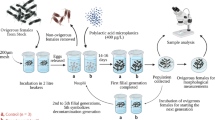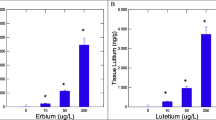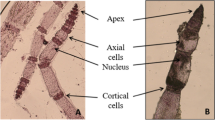Abstract
Previous studies have demonstrated the modulation of glutathione transferases (GSTs) induced by microcystin (MC) alone or in combination with other cyanobacterial secondary metabolites in bivalves. However, interspecies information about which and how GST isoforms are affected by these secondary metabolites is still scarce, especially considering the dynamic process involving their uptake and elimination routes. In this context, the role of GSTs gene expression changes in response to a toxic Microcystis aeruginosa extract were examined for Mytilus galloprovincialis and Ruditapes philippinarum during exposure and recovery phases. The expression levels of sigma 1, sigma 2, pi and mu-class GST genes were analyzed in the hepatopancreas of both bivalve species during cyanobacteria extract exposure (24 h) and post-exposure (24 and 72 h). Only a significant induction of sigma 1-class GST expression was observed for R. philippinarum upon 24-hour exposure of both bivalve species to Microcystis extract. During the recovery phase, GST transcriptional changes for M. galloprovincialis were characterized by an early induction (24 h) of sigma 1 and sigma 2 transcripts. On the other hand, GST transcriptional changes for R. philippinarum during post-exposure phase were characterized by an early induction (24 h) of sigma 1 and mu transcripts and a later induction (72 h) of the four analyzed GST transcripts. Such differences reflect variable GST response mechanisms to cope with MC-producing cyanobacterial blooms exposure between these two bivalve species, revealing a higher sensitivity of R. philippinarum to Microcystis-induced stress than M. galloprovincialis. The results also suggest a much higher level of activity of the GST detoxification system during the recovery phase compared to the period of the stress exposure for both bivalve species.


Similar content being viewed by others
References
Adler V et al. (1999) Regulation of JNK signaling by GSTp. EMBO J 18:1321–1334. https://doi.org/10.1093/emboj/18.5.1321
Amado LL, Monserrat JM (2010) Oxidative stress generation by microcystins in aquatic animals: why and how. Environ Int 36:226–235. https://doi.org/10.1016/j.envint.2009.10.010
Amorim A, Vasconcelos V (1999) Dynamics of microcystins in the mussel Mytilus galloprovincialis. Toxicon 37:1041–1052. https://doi.org/10.1016/S0041-0101(98)00231-1
Best JH, Pflugmacher S, Wiegand C, Eddy FB, Metcalf JS, Codd GA (2002) Effects of enteric bacterial and cyanobacterial lipopolysaccharides, and of microcystin-LR, on glutathione S-transferase activities in zebra fish (Danio rerio). Aquat Toxicol 60:223–231
Buratti FM, Scardala S, Funari E, Testai E (2011) Human glutathione transferases catalyzing the conjugation of the hepatoxin microcystin-LR. Chem Res Toxicol 24:926–933. https://doi.org/10.1021/tx2000976
Buratti FM, Scardala S, Funari E, Testai E (2013) The conjugation of microcystin-RR by human recombinant GSTs and hepatic cytosol. Toxicol Lett 219:231–238. https://doi.org/10.1016/j.toxlet.2013.03.015
Campos A, Vasconcelos V (2010) Molecular mechanisms of microcystin toxicity in animal cells. Int J Mol Sci 11:268–287. https://doi.org/10.3390/ijms11010268
Carneiro M et al. (2017) Modulation of hepatic glutathione transferases isoenzymes in three bivalve species exposed to purified microcystin-LR and Microcystis extracts. Toxicon 137:150–157. https://doi.org/10.1016/j.toxicon.2017.07.003
Carneiro M, Reis B, Azevedo J, Campos A, Osorio H, Vasconcelos V, Martins JC (2015) Glutathione transferases responses induced by microcystin-lr in the gills and hepatopancreas of the Clam Venerupis philippinarum. Toxins 7:2096–2120. https://doi.org/10.3390/toxins7062096
Cho SG et al. (2001) Glutathione S-transferase mu modulates the stress-activated signals by suppressing apoptosis signal-regulating kinase 1. J Biol Chem 276:12749–12755. https://doi.org/10.1074/jbc.M005561200
Fernandes S, Welker M, Vasconcelos VM (2009) Changes in the GST activity of the mussel Mytilus galloprovincialis during exposure and depuration of microcystins. J Exp Zool Part A Ecol Genet Physiol 311:226–230. https://doi.org/10.1002/jez.524
Ferrao-Filho AS, Kozlowsky-Suzuki B (2011) Cyanotoxins: bioaccumulation and effects on aquatic animals. Mar Drugs 9:2729–2772. https://doi.org/10.3390/md9122729
Frova C (2006) Glutathione transferases in the genomics era: new insights and perspectives. Biomol Eng 23:149–169. https://doi.org/10.1016/j.bioeng.2006.05.020
Goncalves-Soares D, Zanette J, Yunes JS, Yepiz-Plascencia GM, Bainy ACD (2012) Expression and activity of glutathione S-transferases and catalase in the shrimp Litopenaeus vannamei inoculated with a toxic Microcystis aeruginosa strain. Mar Environ Res 75:54–61. https://doi.org/10.1016/j.marenvres.2011.07.007
Hao L, Xie P, Fu J, Li G, Xiong Q, Li H (2008) The effect of cyanobacterial crude extract on the transcription of GST mu, GST kappa and GST rho in different organs of goldfish (Carassius auratus). Aquat Toxicol 90:1–7. https://doi.org/10.1016/j.aquatox.2008.07.006
Hayes JD, Flanagan JU, Jowsey IR (2005) Glutathione transferases. Annu Rev Pharmacol Toxicol 45:51–88. https://doi.org/10.1146/annurev.pharmtox.45.120403.095857
Hayes JD, Pulford DJ (1995) The glutathione S-transferase supergene family: regulation of GST and the contribution of the isoenzymes to cancer chemoprotection and drug resistance. Crit Rev Biochem Mol Biol 30:445–600. https://doi.org/10.3109/10409239509083491
He J et al. (2012) Quantitatively evaluating detoxification of the hepatotoxic microcystins through the glutathione and cysteine pathway in the cyanobacteria-eating bighead carp. Aquat Toxicol 116-117:61–68. https://doi.org/10.1016/j.aquatox.2012.03.004
Hoarau P, Damiens G, Romeo M, Gnassia-Barelli M, Bebianno MJ (2006) Cloning and expression of a GST-pi gene in Mytilus galloprovincialis. Attempt Use GST-pi Transcr a Biomark Pollut Comp Biochem Physiol Toxicol & Pharmacol: CBP 143:196–203. https://doi.org/10.1016/j.cbpc.2006.02.007
Jochimsen EM et al. (1998) Liver failure and death after exposure to microcystins at a hemodialysis center in Brazil. N Engl J Med 338:873–878. https://doi.org/10.1056/NEJM199803263381304
Kearse M et al. (2012) Geneious Basic: an integrated and extendable desktop software platform for the organization and analysis of sequence data. Bioinformatics 28:1647–1649. https://doi.org/10.1093/bioinformatics/bts199
Kondo F et al. (1996) Detection and identification of metabolites of microcystins formed in vivo in mouse and rat livers. Chem Res Toxicol 9:1355–1359. https://doi.org/10.1021/tx960085a
Kotai J (1972) Instruction for Preparation of Modified Nutrient Solution Z8 for Algae vol Publication B-11/69. Norwegian Institute for Water Research, Oslo, Norway
Lee YM, Lee KW, Park H, Park HG, Raisuddin S, Ahn IY, Lee JS (2007) Sequence, biochemical characteristics and expression of a novel Sigma-class of glutathione S-transferase from the intertidal copepod, Tigriopus japonicus with a possible role in antioxidant defense. Chemosphere 69:893–902. https://doi.org/10.1016/j.chemosphere.2007.05.087
Li G, Xie P, Fu J, Hao L, Xiong Q, Li H (2008) Microcystin-induced variations in transcription of GSTs in an omnivorous freshwater fish, goldfish. Aquat Toxicol 88:75–80. https://doi.org/10.1016/j.aquatox.2008.03.007
MacKintosh C, Beattie KA, Klumpp S, Cohen P, Codd GA (1990) Cyanobacterial microcystin-LR is a potent and specific inhibitor of protein phosphatases 1 and 2A from both mammals and higher plants. FEBS Lett 264:187–192
Martins JC, Campos A, Osorio H, da Fonseca R, Vasconcelos V (2014) Proteomic profiling of cytosolic glutathione transferases from three bivalve species: Corbicula fluminea, Mytilus galloprovincialis and Anodonta cygnea. Int J Mol Sci 15:1887–1900. https://doi.org/10.3390/ijms15021887
Miller MA et al. (2010) Evidence for a novel marine harmful algal bloom: Cyanotoxin (Microcystin) transfer from land to sea otters. PLoS One 5:e12576. https://doi.org/10.1371/journal.pone.0012576
Pfaffl MW (2001) A new mathematical model for relative quantification in real-time RT-PCR. Nucleic Acids Res 29:e45
Pflugmacher S, Wiegand C, Oberemm A, Beattie KA, Krause E, Codd GA, Steinberg CEW (1998) Identification of an enzymatically formed glutathione conjugate of the cyanobacterial hepatotoxin microcystin-LR: the first step of detoxication. Biochim Et Biophys Acta - General Subj 1425:527–533. https://doi.org/10.1016/S0304-4165(98)00107-X
Pflugmacher S, Wiegand C, Oberemm A, Beattie KA, Krause E, Codd GA, Steinberg CEW (1998) Identification of an enzymatically formed glutathione conjugate of the cyanobacterial hepatotoxin microcystin-LR: the first step of detoxication. Biochim Biophys Acta 1425:527–533
Reis B, Carneiro M, Machado J, Azevedo J, Vasconcelos V, Martins JC (2015) Transcriptional responses of glutathione transferase genes in Ruditapes philippinarum exposed to microcystin-LR. Int J Mol Sci 16:8397–8414. https://doi.org/10.3390/ijms16048397
Sivonen KK, Jones G (1999) Cyanobacterial toxins. In: Chorus I, Bartram J (Eds) Toxic Cyanobacteria in Water. E&FN Spon, London, p 41e111
Urbatzka R, Galante-Oliveira S, Rocha E, Castro LF, Cunha I (2013) Normalization strategies for gene expression studies by real-time PCR in a marine fish species. Scophthalmus Maxim- Mar Genom 10:17–25. https://doi.org/10.1016/j.margen.2013.02.001
Vasconcelos VM (1995) Uptake and depuration of the heptapeptide toxin microcystin-LR in Mytilus galloprovincialis. Aquat Toxicol 32:227–237
Vasconcelos VM, Wiegand C, Pflugmacher S (2007) Dynamics of glutathione-S-transferases in Mytilus galloprovincialis exposed to toxic Microcystis aeruginosa cells, extracts and pure toxins. Toxicon 50:740–745. https://doi.org/10.1016/j.toxicon.2007.06.010
Wang C, Zhao J, Mu C, Wang Q, Wu H, Wang C (2013) cDNA cloning and mRNA expression of four glutathione S-transferase (GST) genes from Mytilus galloprovincialis. Fish Shellfish Immunol 34:697–703. https://doi.org/10.1016/j.fsi.2012.11.020
Wiegand C, Pflugmacher S (2005) Ecotoxicological effects of selected cyanobacterial secondary metabolites: a short review. Toxicol Appl Pharmacol 203:201–218. https://doi.org/10.1016/j.taap.2004.11.002
Xu C, Pan L, Liu N, Wang L, Miao J (2010) Cloning, characterization and tissue distribution of a pi-class glutathione S-transferase from clam (Venerupis philippinarum): Response to benzo[alpha]pyrene exposure Comparative biochemistry and physiology. Toxicol & Pharmacol: CBP 152:160–166. https://doi.org/10.1016/j.cbpc.2010.03.011
Yang Y, Cheng JZ, Singhal SS, Saini M, Pandya U, Awasthi S, Awasthi YC (2001) Role of glutathione S-transferases in protection against lipid peroxidation. Overexpression of hGSTA2-2 in K562 cells protects against hydrogen peroxide-induced apoptosis and inhibits JNK and caspase 3 activation. J Biol Chem 276:19220–19230. https://doi.org/10.1074/jbc.M100551200
Zhang L et al. (2012) Expression profiles of seven glutathione S-transferase (GST) genes from Venerupis philippinarum exposed to heavy metals and benzo[a]pyrene Comparative biochemistry and physiology. Toxicol & Pharmacol: CBP 155:517–527. https://doi.org/10.1016/j.cbpc.2012.01.002
Acknowledgements
This research was partially supported by the European Regional Development Fund (ERDF) through the COMPETE—Operational Competitiveness Programme and national funds through FCT (Foundation for Science and Technology), under the project PTDC/MAR-EST/4614/2012 (FCOMP-01-0124-FEDER-029452) and UID/Multi/04423/2013 and by the project ALERTOXNET- EAPA_317/2016 of the Interreg Atlantic Area Program. José Carlos Martins is supported by a research contract financed by national funds through FCT, I.P., within the scope of the project DL57/2016/CP1331/CT0002.
Author information
Authors and Affiliations
Corresponding author
Ethics declarations
Conflict of interest
The authors declare that they have no conflict of interest.
Electronic supplementary material
Rights and permissions
About this article
Cite this article
Antas, P., Carneiro, M., Reis, B. et al. GST transcriptional changes induced by a toxic Microcystis aeruginosa strain in two bivalve species during exposure and recovery phases. Ecotoxicology 27, 1272–1280 (2018). https://doi.org/10.1007/s10646-018-1980-y
Accepted:
Published:
Issue Date:
DOI: https://doi.org/10.1007/s10646-018-1980-y




